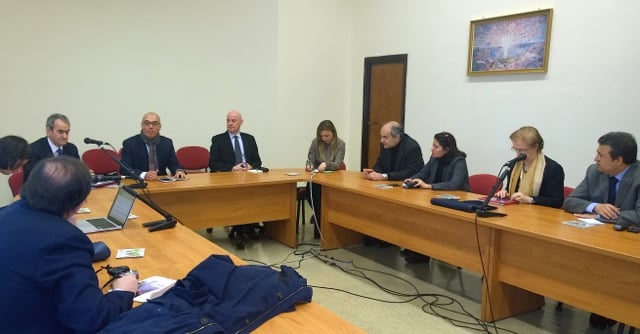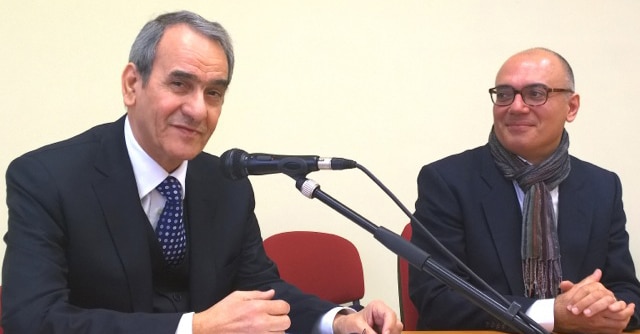
Normal
0
21
false
false
false
ES
X-NONE
X-NONE
On 27 March, in Italy CEMOFPSC organized the conference “On the Path Toward Unity. An overwiev on Lybia” in Palazzo San Calisto in Rome.
/* Style Definitions */
table.MsoNormalTable
{mso-style-name:”Tabla normal”;
mso-tstyle-rowband-size:0;
mso-tstyle-colband-size:0;
mso-style-noshow:yes;
mso-style-priority:99;
mso-style-qformat:yes;
mso-style-parent:””;
mso-padding-alt:0cm 5.4pt 0cm 5.4pt;
mso-para-margin-top:0cm;
mso-para-margin-right:0cm;
mso-para-margin-bottom:10.0pt;
mso-para-margin-left:0cm;
mso-pagination:widow-orphan;
font-size:11.0pt;
font-family:”Calibri”,”sans-serif”;
mso-ascii-font-family:Calibri;
mso-ascii-theme-font:minor-latin;
mso-fareast-font-family:”Times New Roman”;
mso-fareast-theme-font:minor-fareast;
mso-hansi-font-family:Calibri;
mso-hansi-theme-font:minor-latin;}
 The meeting was addressed by H. E. Mr. Mustafa Ali Rugibani, Libyan Ambassador to the Holy See, and was moderated by Giovanni Cubeddu, CEMOFPSC Italy.
The meeting was addressed by H. E. Mr. Mustafa Ali Rugibani, Libyan Ambassador to the Holy See, and was moderated by Giovanni Cubeddu, CEMOFPSC Italy.
Titled “Libya: What’s after the Revolution of February 17th” the Ambassador made an analysis on the current situation in Libya, with reference to the events that took place in this country after the uprising against the Gaddafi regime (many lived from his own experience, holding various positions in the government), and the ongoing complex democratic process is going through, after 42 years of oppression.
In that sense, in this process towards democracy, towards state-building, the speaker said that the international community should respect the sovereignty of the Libyan country, on one hand, and assist in resolving their internal problems on the other. However, the application of this theory is complicated, since the international community is waiting Libya to expose their needs, but the government lacks the necessary experience to do so and also political differences between the parties prevented from having a real vision of actual and future needs of Libya. Likewise, the international community can’t offer help because hasn’t got presence in the territory.
In Ambassador’s opinion, what the international community wants is:
l- The continued flow of oil.
2- Preventing the illegal immigration.
3- Preventing the so-called “terrorism”.
4- To construct a stable democratic system is a Libyan right, so all the international community must take it seriously into consideration.
Normal
0
21
false
false
false
ES
X-NONE
X-NONE
On the other hand, these are the main interests of the Libyan government:
l- To respect the Libyan legal constitutions represented in the National Council and the elected government.
2- Doesn’t accept the return or the reproduction of the EX regime.
3- Refuses the aggression against the Libyan oil, considering any attempt to sell or export it without the authorization of the Libyan Government is a piracy which is prohibited internationally.
4- Refuses any interference in the Libyan unity and stability and all the countries must consign all the wanted persons to the Libyan authorities
5- To incriminate the use of weapons against the government or the citizens by any militia.
6- To ask the UN to send a task force in order to collect the weapons in Libya.
7- Doesn’t accept any attempt of federalism.
8- Prevent the selling of weapons to Libya unless to the legal government.
FPSC in Italy in the last weeks has also organized the following events in Rome:
The meeting with Latin American ambassadors devoted to the issue of technology in Latin America that took place on February 28 at the NH hotel Giustiniani, with the participation of the ambassadors of Colombia, Juan Sebastian Betancourt; of Uruguay, Alberto Breccia; and Brazil, Ricardo Neiva Tavares. The event gathered about thirty people including journalists and diplomats.
On March 31st , an encounter of diplomats and journalists was held at the NH hotel Giustiniani to discuss together the theme: “The new triangulation European Union-Latin America-Asia, myth or reality?”. The speakers were the Ambassador of the United Mexican States in Italy and ILAI president, Dr. Miguel Ruiz-Cabañas Izquierdo and the General Secretary of the Foundation Magna Carta, Francesca Traldi.[/fusion_builder_column][/fusion_builder_row][/fusion_builder_container]

